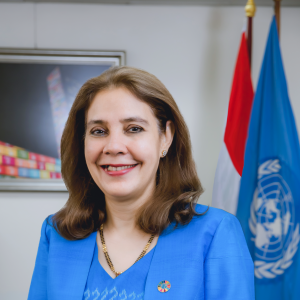I am pleased to join you as we leverage a whole-of-government approach under the leadership of MOFA towards SDG acceleration.
This annual consultative forum brings line ministries together to deepen Government-UN partnerships and further align our priorities.
The UN can be only as effective as its partnerships and Indonesia is an excellent example of that.
This forum is becoming a model for Member States on forging effective collaborations between the UN and Governments.
I learned this first-hand recently in New York, where I had the opportunity to brief Member States on Indonesia’s robust SDG progress with six out of 10 indicators on track.
Capitalizing on this momentum will be vital to make good on the President’s vision of transforming Indonesia into a developed nation.
Your Excellency, MOFA is showing great leadership on multilateralism while leveraging Indonesia’s influence on the global stage for building consensus on critical agendas that impact us all.
We saw this recently at the Summit of the Future and with Indonesia’s key role on innovative financing, ocean governance, and the creative economy, which are integral to just, inclusive and green transformations.
This growing global influence is reflected by the appointment of Ibu Retno as a special UN envoy to ensure a water-secure future for all.
Indonesia’s development ambitions are supported by the UN Country Team’s priority to foster inclusive development, green growth and digital transformation to leave no one behind.
UN Indonesia brings to bear policy competency in partnership with line ministries while leveraging our on-the-ground presence in a quarter of districts nationwide, including 39 out of the 62 most disadvantaged ones.
We stand ready to pull our weight even more in support of the Government’s transformative vision for the benefit of all Indonesians.
With 30 agencies we have a broad scope of engagement, and I would like to speak to 3 key areas where the UN as a system will be working closely with Government to accelerate progress.
One, the UN is responding to a request to provide technical assistance to the government’s nutritious meals programme.
An initiative led by UNICEF, WHO, WFP, IFAD and FAO is designed to reach over 80 million infants, children, lactating and pregnant mothers to address stunting and malnutrition.
This includes analysing local supply chains, food safety, food diversity and bio fortification, amongst others.
At the same time, the UN is keen to explore the potential of a sustainability linked SDG bond for the nutritious meals programme to mobilize additional financing.
Two, the UN is leveraging innovative financing models to bridge funding gaps for the SGDs.
In partnership with the public and private sectors, the UN has already unlocked $10 billion through thematic sovereign SDG and green bonds.
Of this, $3.2 billion were mobilised last year, benefiting 48 million people, half of whom were women and children, with increased access to vaccinations, scholarships, and basic services.
We need to scale up the supply of funds into the economy to achieve the country’s targeted growth trajectory of an annual 8% growth in GDP to break out of the middle-income trap.
The UN is also working to facilitate technical assistance for affordable green housing, with a focus on circularity, which is a priority of the President.
The UN is also partnering with five national banks that have adopted its principles of responsible banking to develop sustainable financing plans to scale up ESG investments.
Every percentage point increase in ESG investments by these banks unlocks $1.23 billion for green growth.
Indonesia’s leadership on innovative financing is to be leveraged across the Global South, which has traditionally relied on traditional donors.
This is critical as SDG financing needs to be increasingly mobilised from the private sector.
Three, the UN is partnering on bolstering gender equality.
Women are instrumental to the government’s forward-looking economic agenda with nearly two-thirds of all MSMEs led by women, a rate twice the global average. Women-owned MSMEs contribute to almost a quarter of Indonesia’s labour force.
Beyond their economic contributions, girls and women are key to peacebuilding, social inclusion and community empowerment.
One priority area targets gender-based violence. Digitization is essential for this as demonstrated by an AI chatbot led by MOFA to provide a platform for Indonesian migrant population to access reliable information and services through a victim-centred approach.
Importantly, we know from surveys that three out of four women in Indonesia are optimistic about the future and one in two are positive about the potential benefits of AI.
Along with women, young people will be crucial to transformations guided by the government’s clarity of vision.
Indonesia has a growing youth demographic dividend with nearly half of the population below the age of 30.
Young people are the change makers of today and the leaders of tomorrow.
The UN is committed to deepening engagement with them in partnership with line ministries.
Today is an opportunity for us to take a step forward towards delivering at pace and scale needed to turbo-charge the SDGs.
Thank you.







